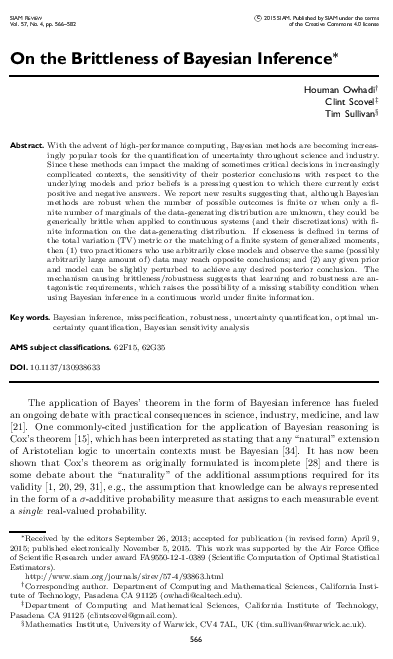
Bayesian Brittleness in SIAM Review
The 2015 Q4 issue of SIAM Review will carry an article by Houman Owhadi, Clint Scovel, and myself on the brittle dependency of Bayesian posteriors as a function of the prior. This is an abbreviated presentation of results given in full earlier this year in Elec. J. Stat. The PDF is available for free under the terms of the Creative Commons 4.0 licence.
H. Owhadi, C. Scovel, and T. J. Sullivan. “On the brittleness of Bayesian inference.” SIAM Review 57(4):566–582, 2015.
Abstract. With the advent of high-performance computing, Bayesian methods are becoming increasingly popular tools for the quantification of uncertainty throughout science and industry. Since these methods can impact the making of sometimes critical decisions in increasingly complicated contexts, the sensitivity of their posterior conclusions with respect to the underlying models and prior beliefs is a pressing question to which there currently exist positive and negative answers. We report new results suggesting that, although Bayesian methods are robust when the number of possible outcomes is finite or when only a finite number of marginals of the data-generating distribution are unknown, they could be generically brittle when applied to continuous systems (and their discretizations) with finite information on the data-generating distribution. If closeness is defined in terms of the total variation (TV) metric or the matching of a finite system of generalized moments, then (1) two practitioners who use arbitrarily close models and observe the same (possibly arbitrarily large amount of) data may reach opposite conclusions; and (2) any given prior and model can be slightly perturbed to achieve any desired posterior conclusion. The mechanism causing brittleness/robustness suggests that learning and robustness are antagonistic requirements, which raises the possibility of a missing stability condition when using Bayesian inference in a continuous world under finite information.
Published on Friday 6 November 2015 at 12:00 UTC #publication #siam-review #ouq #bayesian #owhadi #scovel